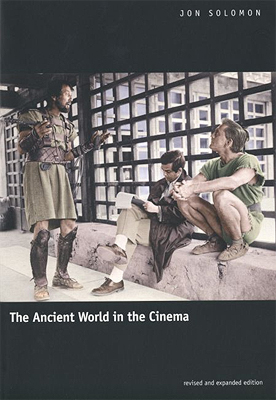
Non-fiction
Pages: 326
First Published: 2001 (revised and expanded edition)
Synopsis: This entertaining and useful book provides a comprehensive survey of films about the ancient world, from The Last Days of Pompeii to Gladiator. Jon Solomon catalogues, describes, and evaluates films set in ancient Greece and Rome, films about Greek and Roman history and mythology, films of the Old and New Testaments, films set in ancient Egypt, Babylon, and Persia, films of ancient tragedies, comic films set in the ancient world, and more. The book has been updated to include feature films and made-for-television movies produced in the past two decades. More than two hundred photographs illustrate both the films themselves and the ancient sources from which their imagery derives.
My Thoughts: As the synopsis says, this book sets out to catalogue, describe and evaluate every non-documentary film that fits into one of its chapters: Greek and Roman History; Greek and Roman Mythology; the Old Testament; the New Testament; Babylon, Egypt, Persia, and the Ancient Orient; Ancient Tragedy and The Satyricon; Ancient Comedy and Satirized Ancients; and the Muscleman Epics. This includes films silent and sound, American and overseas, Hollywood and made-for-TV. Although it’s a little out of date now (the most recent movie it mentions is 2000’s Gladiator), the book’s large scope ensures that it remains a fantastic resource for anyone interested in the genre.
I do want to mention that this is not a book I recommend reading cover-to-cover unless you feel particularly inclined to do so. Before I started reading it, I expected it to be a book of film analysis, but it really isn’t. The closest it comes to analysis is in the muscleman chapter, where Solomon attempts to describe the plot of every muscleman film in one go. The rest of the time, depending on how much he has to say about a particular film, he’ll introduce it, talk a bit about what went on behind the scenes, describe the plot and any scenes he finds especially important, comment on how the film compares with what we know of the history it’s based on, and then give his evaluation. (If you want to skip all that, you can flip to the list of film titles, ordered by subject, in the back of the book.) Absolutely this book is a great resource, but it makes for dry reading if you try to read it all the way through. I also think that the fact that Solomon started this book in the 1970s really shows in the way he describes the films. Now that it’s easy to watch movies at home, it isn’t necessary for an author to devote three pages to a thorough description of the chariot race from Ben-Hur. If Solomon decides to release a third edition, I think it would make sense to shorten the scene summaries for movies that are widely available.
One thing I do really like about this book, however, is Solomon’s stance that “historical accuracy and artistic necessity belong to different families.” He has no problem praising a historically inaccurate film if he feels it’s successful as a film – a breath of fresh air when so many people seem to believe that “this movie deviates from its source” is the exact same thing as “this is a bad movie.”
Since this is a Trojan War blog, I should perhaps mention that pages 103 to 111 and 263 to 268 are the pages to check out for movies about the Trojan War and its aftermath. I was surprised to learn that there are a few I haven’t seen yet! I’m really looking forward to watching them, as well as more than a few other movies introduced to me by this book, which I definitely recommend as a solid reference book for anyone interested in movies about the parts of the ancient world that it covers.
Buy it at: Amazon.com, Amazon.ca